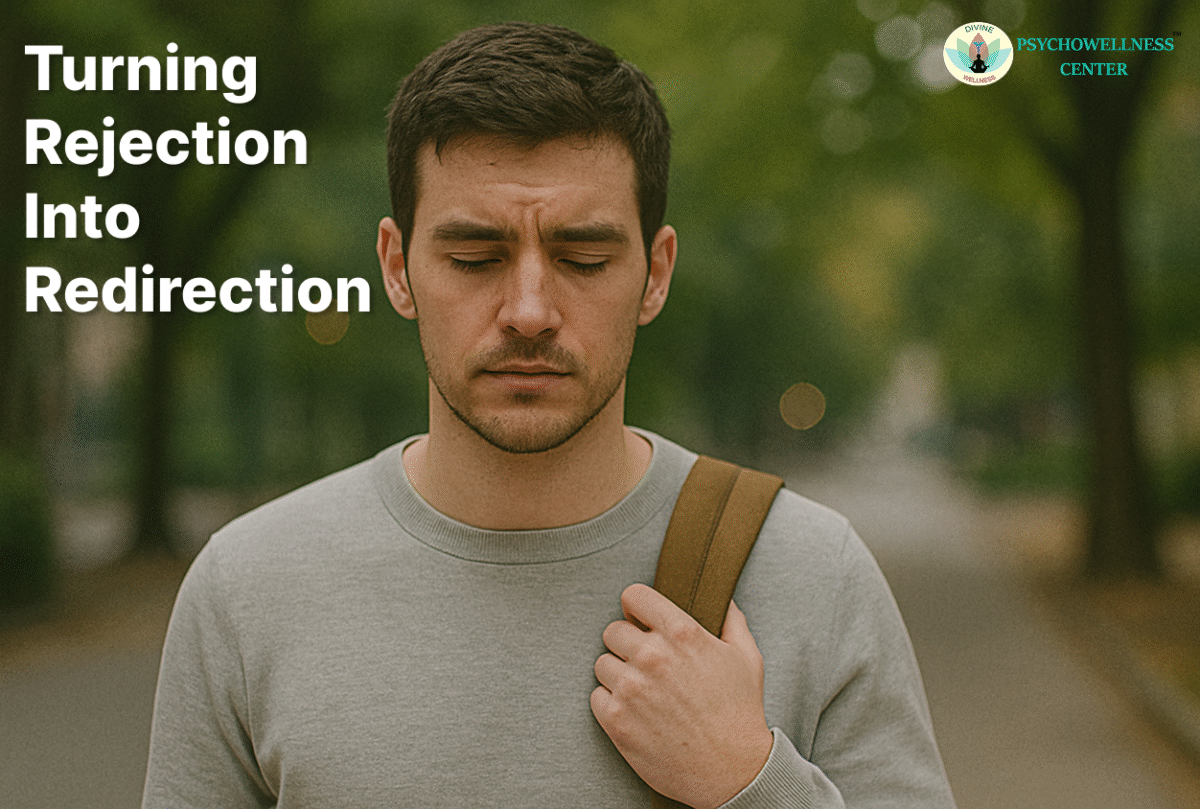Rejection is a part of life that no one escapes. Whether it’s a declined job application, a broken relationship, or a creative idea turned down, rejection can be painful, stressful, discouraging and at times it can lead to anxiety, depression. But what if rejection isn’t a dead end, but rather a redirection toward something more meaningful? With the right mindset and support, such as counselling, rejection can become a powerful catalyst for growth, change, and self-discovery.
Rejection as Redirection: A New Perspective
Many people view rejection as a personal failure. In reality, it’s often a sign that the opportunity wasn’t the right fit. Research by Naomi Eisenberger (2012) shows that rejection activates the same brain regions associated with physical pain, which explains why it feels so intense. However, this discomfort can be transformative. When we shift our perspective, rejection is not the end of the road, but a chance to reroute toward better opportunities.
Strategies for Turning Rejection into Redirection
- Reframe the Narrative:- Instead of internalising rejection as a reflection of your inadequacy, ask yourself: What can I learn from this? What direction might this be pointing me toward? Success stories abound of people who overcame rejection. J.K. Rowling’s initial manuscript rejections eventually led to one of the most beloved book series of all time. Through cognitive reframing, a technique from cognitive-behavioural therapy (CBT), individuals can shift negative thoughts to more empowering ones, fostering optimism and resilience.
- Reflect and Learn:- Every rejection holds a lesson. Was your approach aligned with your goals? Were there gaps in preparation or presentation? Self-reflection, or guided introspection through counselling, can help uncover patterns and areas for growth. Even without feedback, asking honest questions can turn a painful moment into a turning point.
- Build Resilience:- Resilience, the ability to bounce back from setbacks, isn’t something you’re born with; it’s something you develop. According to research by Southwick and Charney (2012), resilient individuals see challenges as opportunities to adapt and grow. Embracing a growth mindset, as described by psychologist Carol Dweck, helps transform setbacks into stepping stones. Each rejection strengthens your emotional endurance for the future.
- Explore New Opportunities:- A closed door may be pointing toward an open window. After rejection, consider alternative paths, new industries, creative outlets, or different social circles. Many professionals who’ve faced rejection have gone on to find fulfillment in unexpected places, such as entrepreneurship or freelance work. Staying curious and proactive can uncover opportunities you wouldn’t have otherwise seen.
- Practice Self-Compassion:- Rejection can damage self-worth. Practicing self-compassion, treating yourself with kindness and understanding is essential to healing. According to psychologist Kristin Neff, self-compassion involves recognizing that failure and disappointment are part of the shared human experience. This practice builds emotional resilience and helps you face future challenges with greater confidence.
The Role of Counseling in Overcoming Rejection
Sometimes, the emotional weight of rejection becomes too heavy to carry alone. What begins as a single setback can spiral into self-doubt, anxiety, or even depression, especially when left unaddressed. In such cases, counseling can play a transformative and healing role, offering both emotional support and practical strategies for recovery.
Why Seek Counseling?
People turn to counseling after rejection for various reasons:
- Persistent self-doubt or low self-esteem
- Anxiety or depression triggered by setbacks
- Loss of direction or purpose
- Difficulty moving on from past failures
- Repeated patterns of rejection in career or relationships
A trained counselor provides a safe, judgment-free space to process emotions and build coping strategies.
Methods Used in Counseling
Counselors use various therapeutic approaches depending on the individual’s needs. Some common methods include:
- Cognitive-Behavioral Therapy (CBT): Helps clients identify and change unhelpful thought patterns that arise after rejection.
- Solution-Focused Brief Therapy (SFBT): Emphasizes short-term, goal-oriented conversations that help individuals move forward with confidence.
- Mindfulness-Based Therapy: Encourages clients to stay present, reduce emotional reactivity, and cultivate acceptance.
- Narrative Therapy: Helps individuals re-author their life stories by viewing rejection as part of a larger journey toward personal meaning.
Counselling not only addresses the emotional pain of rejection but also empowers individuals to turn that pain into purposeful action.
Real-Life Examples of Redirection
History is full of inspiring stories. Walt Disney was once fired for lacking imagination. Oprah Winfrey was told she wasn’t fit for TV. Both used rejection as fuel for redirection. Rather than seeing rejection as failure, they used it as motivation to find their true paths. Their experiences show that setbacks are often setups for something greater.
Conclusion
Rejection, while painful, is not the end of your story. It can be the moment that shifts you onto a better path, one you might not have discovered otherwise. By reframing the experience, reflecting on its lessons, developing resilience, exploring new options, and seeking help through counselling when needed, you can turn rejection into redirection.
So the next time rejection shows up, take a moment before giving in to discouragement. You might just be one detour away from a more meaningful destination.
If you’re looking for the “best psychologist near me,” make an appointment at the Psychowellness Centre in Janakpuri or Dwarka by calling 011-47039812 or 7827208707. The TalktoAngel platform also assists clients seeking the ease of online treatment tailored to their emotional requirements.
Seek guidance from Dr. R.K. Suri, a prominent clinical psychologist and life coach, along with Mrs. Chanchal Agarwal, a well-known counseling psychologist.
References
- Beck, J. S. (2011). Cognitive Behavior Therapy: Basics and Beyond. Guilford Press.
- Dweck, C. S. (2006). Mindset: The New Psychology of Success. Random House.
- Eisenberger, N. I. (2012). The pain of social disconnection: Examining the shared neural underpinnings of physical and social pain. Nature Reviews Neuroscience, 13(6), 421–434.
- Neff, K. D. (2011). Self-Compassion: The Proven Power of Being Kind to Yourself. William Morrow.

